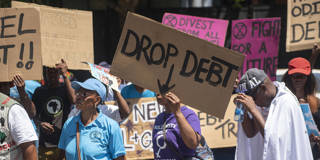The sovereign-debt crisis is hitting Africa particularly hard and could lead to a lost decade of development. While the G20 has tried to ease the burden, its Common Framework has proven ineffective and needs to be fixed, and international institutions must make room at the policymaking table for African countries.
ADDIS ABABA – One in five people globally live in countries that are in debt distress or at risk of it. Two-thirds of low-income countries – most of them in Africa – fall into this category, while eight of the nine countries currently in debt distress are on the continent.
A confluence of factors has created this mounting debt crisis. With booming populations and massive infrastructure needs, coupled with the declining availability of official development assistance and concessional financing, African governments took advantage of historically low interest rates in the 2010s and borrowed heavily from international capital markets and China. Consequently, debt stocks more than doubled between 2010 and 2020.
But that debt has become a lot more expensive. Since 2020, the continent has been hit by a series of exogenous shocks. COVID-19, the Ukraine war, and worsening climate conditions have confronted many African governments with credit-rating downgrades, which rapidly increased their borrowing costs and made tapping international debt markets prohibitively expensive. Moreover, the US Federal Reserve’s massive interest-rate hikes since March 2022 have dealt a double whammy to African countries, whose loans are mostly denominated in dollars: their debt-service costs have gone up and their currencies’ dollar exchange rate has gone down. In 2024, African countries will spend around $74 billion on debt service, up from $17 billion in 2010. Two states – Ghana and Zambia – have already defaulted, while Chad and Ethiopia are in restructuring talks.

ADDIS ABABA – One in five people globally live in countries that are in debt distress or at risk of it. Two-thirds of low-income countries – most of them in Africa – fall into this category, while eight of the nine countries currently in debt distress are on the continent.
A confluence of factors has created this mounting debt crisis. With booming populations and massive infrastructure needs, coupled with the declining availability of official development assistance and concessional financing, African governments took advantage of historically low interest rates in the 2010s and borrowed heavily from international capital markets and China. Consequently, debt stocks more than doubled between 2010 and 2020.
But that debt has become a lot more expensive. Since 2020, the continent has been hit by a series of exogenous shocks. COVID-19, the Ukraine war, and worsening climate conditions have confronted many African governments with credit-rating downgrades, which rapidly increased their borrowing costs and made tapping international debt markets prohibitively expensive. Moreover, the US Federal Reserve’s massive interest-rate hikes since March 2022 have dealt a double whammy to African countries, whose loans are mostly denominated in dollars: their debt-service costs have gone up and their currencies’ dollar exchange rate has gone down. In 2024, African countries will spend around $74 billion on debt service, up from $17 billion in 2010. Two states – Ghana and Zambia – have already defaulted, while Chad and Ethiopia are in restructuring talks.